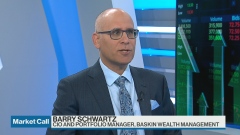Jun 21, 2023
OSFI buffer hike could challenge banks in a deep recession, expert says
, BNN Bloomberg
It's not terribly surprising the stability buffer for Canada's banks was raised: John Aiken
A recent regulatory hike to requirements for Canadian banks’ cash reserves could pose a challenge to some lenders in the event of a deep recession, according to one economist.
This week, the Office of the Superintendent of Financial Institutions hiked the domestic stability buffer to 3.5 per cent of risk-weighted assets, up from three per cent, effective Nov. 1.
The change means Canada’s big six banks will need Common Equity Tier 1 capital of at least 11.5 per cent of risk-weighted assets. All of the big banks are currently above that threshold.
That said, John Aiken, head of Canadian research at Barclays, believes Bank of Montreal, Scotiabank and CIBC are closest to the buffer number, and could potentially be forced into a capital raise in the event of a deep recession, though he considers that an unlikely outcome at the moment.
“Because they all have a couple quarters to accumulate the capital, we think they’re going to fine,” he told BNN Bloomberg Wednesday.
“If the recession is faster and harder than we anticipate, yes you could see those three be forced to raise, but right now we don’t expect that to happen.”
The buffer could also impact bank earnings and profits.
“What you’re going to see is, if we have a deep and prolonged recession – which is not a base case scenario – but then you could see a decline in earnings such that you could actually see negative earnings (and) a decrease in capital,” Aiken said.
Aiken added that in the event of a long recession, the buffer may actually come down.
“What we have seen in the past, though, is the regulator then in times of stress will lessen the stability buffer and we’ll actually see that 11.5 per cent decline, presumably before the banks will be forced to issue capital,” he said.








